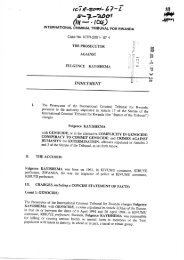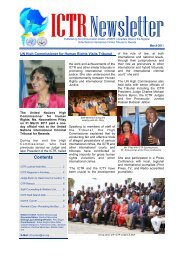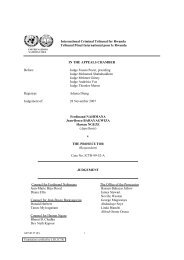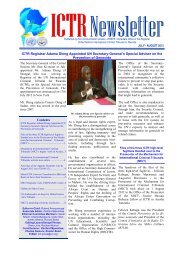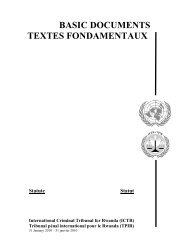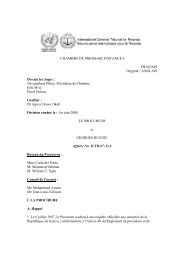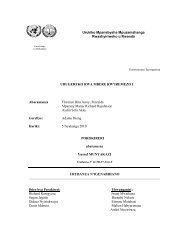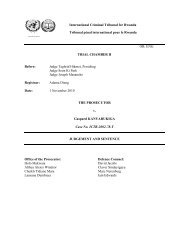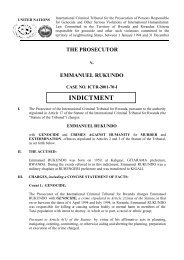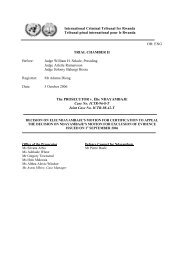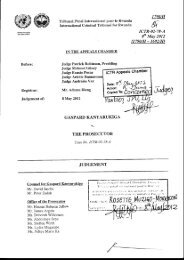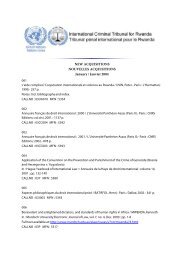Report of Proceedings - International Criminal Tribunal for Rwanda
Report of Proceedings - International Criminal Tribunal for Rwanda
Report of Proceedings - International Criminal Tribunal for Rwanda
Create successful ePaper yourself
Turn your PDF publications into a flip-book with our unique Google optimized e-Paper software.
Another challenge that may be perceived as relating to independence is the question <strong>of</strong><br />
non-appearance <strong>of</strong> the defence in the courtroom. There have been several different scenarios in<br />
Arusha, either with an individual boycott or a group boycott by all the accused, or by a strike<br />
on behalf <strong>of</strong> the defence counsel, some or all. It may be argued that this is a threat to the<br />
independence <strong>of</strong> the institution. Judge Møse noted that much depends on how the Chamber<br />
reacts to such challenges. In Arusha, the Chambers have been firm but reasonable in this regard<br />
and the proceedings have continued. There has never been any acceptance <strong>of</strong> being held<br />
hostage, which could in the long run be seen as an issue <strong>of</strong> lack <strong>of</strong> independence.<br />
Judge Møse then spoke about management. In a normal national court everything flows<br />
reasonably well. However, in international and ad hoc settings, there are many international<br />
players and multiple States, all having to co-operate. There are thus many more possible<br />
problems, both external and internal. This has implied that in order to speed up proceedings the<br />
judges may have to be more proactive in terms <strong>of</strong> problem resolution than they would be at the<br />
national level. When judges become a proactive administrative judge, <strong>for</strong> example, getting in<br />
touch with administrative or <strong>for</strong>eign, authorities, can it be argued that independence is at stake?<br />
Could it be argued that the ICTR gets too close to dependence on the executive organ, here<br />
being represented by other States or by UN headquarters? His answer to this is that such<br />
allegations carry limited weight.<br />
The Registry has the main responsibility <strong>of</strong> the budget. It is a critical tool <strong>for</strong> any<br />
institution, national or international. When judges are asked, they provide input on the budget.<br />
Judges are uniquely qualified to assess the needs <strong>of</strong> the trials and to objectively weigh the<br />
concerns <strong>of</strong> all parties in the courtroom. Some believe that this could that be seen as getting too<br />
close to the executive branch. Judge Møse contends that this is not the case and he has never<br />
experienced it as a problem.<br />
Judge Møse concluded his discussion with a brief discussion on completion strategies<br />
and the perception that such strategies may constrain the activities <strong>of</strong> a tribunal. Both ad hoc<br />
tribunals have a completion strategy and the question arises whether the deadline set by the<br />
Security Council poses a threat to the independence <strong>of</strong> an ad hoc <strong>Tribunal</strong> by constraining its<br />
activities. Judge Møse contends that the Chambers will continue to per<strong>for</strong>m their functions in<br />
accordance with fair trial principles, irrespective <strong>of</strong> any deadlines. It is more a matter <strong>of</strong> a<br />
reasonable division <strong>of</strong> work between international and national criminal justice than a matter <strong>of</strong><br />
independence.<br />
“The Challenges <strong>of</strong> Administration <strong>of</strong> <strong>International</strong> <strong>Criminal</strong> <strong>Tribunal</strong>s with<br />
Specific Reference to ICTR,” presented by Mr. Adama Dieng<br />
Mr. Dieng began his presentation with the assertion that there is a vast difference between<br />
the work <strong>of</strong> the Registry in a national jurisdiction and in an international jurisdiction. Both are<br />
vested with a mission to provide the court and the litigants with administrative services that are<br />
necessary <strong>for</strong> the fair and prompt resolution <strong>of</strong> cases. However, the real difference lies in the<br />
lack <strong>of</strong> a pre-existing administrative apparatus against which international jurisdiction may<br />
lean back to ensure their efficiency.<br />
27




